'I believe in my guide runner more than myself', says blind Indian athlete
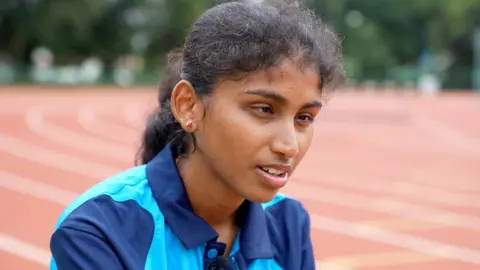 BBC
BBC"When I was growing up, everyone in my village would say: 'She is blind, she is a waste'," says Rakshitha Raju. Now, aged 24, she is one of India's top middle distance para athletes. "It makes me so proud," she says.
Rakshitha was born blind in a remote village in southern India and had lost both her parents by the age of 10. She was raised by her grandmother who is hearing and speech impaired.
"Both of us are disabled, so my grandma understood me," she says.
When Rakshitha was about 13, the sports teacher at her school took her aside and told her she had the potential to be a great athlete.
"I wondered: 'How? I am blind, so how do I run on a track I can't see?'" she recalls.
Her teacher explained that visually impaired runners can have a guide, who runs alongside them. The athletes are joined by a tether - a short strap with a loop on both ends for each of them to hold on to.
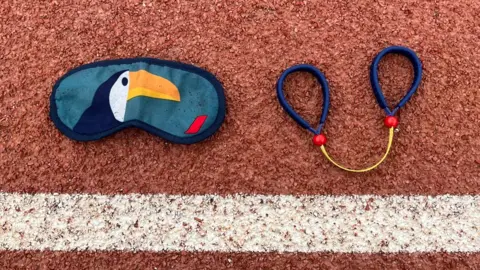
For a while, other pupils acted as guide runners for Rakshitha. Then in 2016, when she was 15, she competed in the National Games, where a man called Rahul Balakrishna spotted her.
A middle-distance runner, Rahul had previously competed in the 1500m himself. He had been introduced to para athletics by a coach at the Paralympic Committee of India (PCI) a few years earlier, while recovering from an injury.
There was a shortage of guides and coaches and Rahul decided to take on both roles. The government pays him a salary for the coaching side of his work, but it does not pay guide runners.
However, if a visually impaired runner wins an international competition, their guide also gets a medal - something Rahul had not achieved in his own running career. "I felt proud that I could do this for myself and my country," he says.
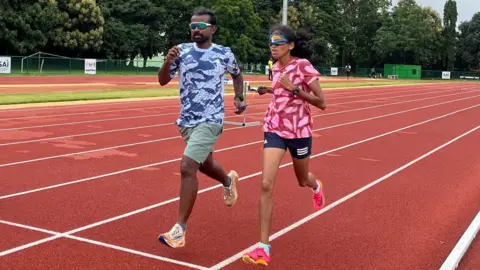
He invested his own time and money to support Rakshitha, helping her move to Bangalore in 2018 so she could have access to better training facilities.
When they are running "it's the small things that matter", says Rahul. "When they are approaching a curve, the guide has to alert the athlete or when a competitor is overtaking, he has to tell the athlete so they can put in a little more effort."
Competition rules mean they can't hold hands - they can only be connected by the tether, and the guide-runner is not allowed to push, pull or otherwise propel the visually impaired athlete.
Over time, the pair have built up a strong bond and now "I believe in my guide runner more than myself", says Rakshitha.
They won gold medals at the 2018 and 2023 Asian Games, returning to a resounding welcome in Rakshitha's village. She smiles as she describes how the people who used to taunt her organised a procession for her, cheering and waving flags.
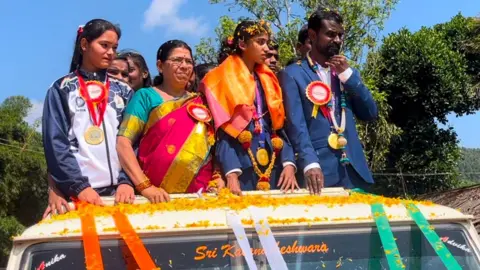
Rakshitha became the first blind Indian woman to qualify for the 1500m in the Paralympics and she competed with Rahul in Paris in 2024.
They missed out on a medal in France, but India's only other visually impaired female athlete to qualify for Paris, sprinter Simran Sharma, did make it to the podium, bringing home a bronze.
Simran is partially sighted and when she started running, she ran alone.
But in 2021, when Simran competed in the Tokyo Paralympics, she strayed out of her lane and realised that she would need a guide if she wanted to carry on running.
But the search proved challenging. "It can't be any athlete. You need someone whose technique matches yours and who runs as fast as you do," she explains.
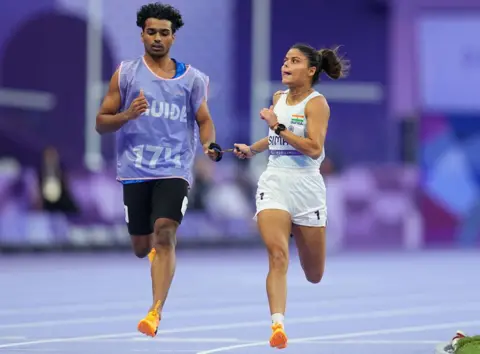 Getty Images
Getty ImagesSimran finally spotted a young athlete called Abhay Kumar, who was training at the same place as her. The 18-year-old was between competitions and guiding Simran was an opportunity for him to get experience at international events.
"They sent me videos and after watching them I thought: 'I am a fast learner, this is going to be easy'," he says. "But when I ran for the first time, it turned out to be very difficult." Every movement has to be synchronised.
Simran and Abhay did not have time to practice together for long before their first international competition - the 2024 World Para Athletics Championships in Japan - just a few weeks after they met.
Their first race, the 100m, ended in disaster.
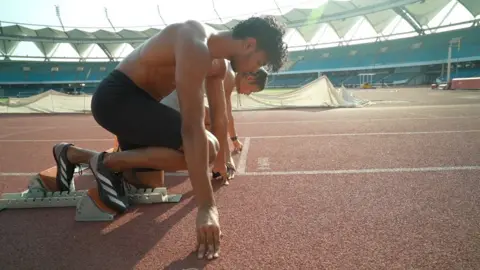
"Neither of us knew the rules properly," says Simran. Abhay "thought he had to stop to let me cross the line first, so he stopped completely". They were disqualified as he should have kept going and crossed the line just behind her.
But by the time they got to the 200m race, they knew what they were doing and struck gold. Simran became the World Champion in the T12 category.
Riding on that high, they went to the Paralympics in Paris. They came fourth in the 100m, but won bronze in the 200m race and Simran became the first Indian woman with a visual impairment to win a Paralympic medal.
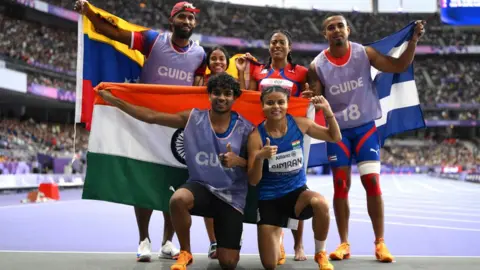 Getty Images
Getty ImagesBut Simran is worried how long Abhay will stay as her guide. He has his own career to think of too.
Although guide runners get a medal when a pair wins, the Paralympic Committee of India (PCI) says it cannot support guides with salaries, cash prizes or offer a long-term career path.
"All we can do is support short-term needs like their food, accommodation, transport and training facilities," says the PCI's national athletics coach Mr Satyanarayana, who goes by one name.
Both Rakshitha and Simran now have sponsorship deals which help fund their training. They pay their guides themselves and give them a share of any prize money they win. But Rahul and Abhay would like more support from the state and want to be allowed to apply for public sector jobs reserved for sportsmen and women - like the athletes they work with.
Despite the uncertainty around her future with Abhay, Simran is already looking ahead to the next Paralympic Games in Los Angeles. "I won't rest till I change the colour of this medal," she says, hoping that next time she will win gold.
Rakshitha is hoping for a medal next time too, with Rahul at her side. "She must win a medal," he says. "There are many like her in villages. They don't know about sports and the possibilities. Rakshitha would be a role model for them."
The BBC Indian Sportswoman Of The Year (ISWOTY) Award is back with its fifth edition to celebrate and honour the remarkable achievements of women athletes in India. Find out about the nominees - the winner will be announced on 17 February.
